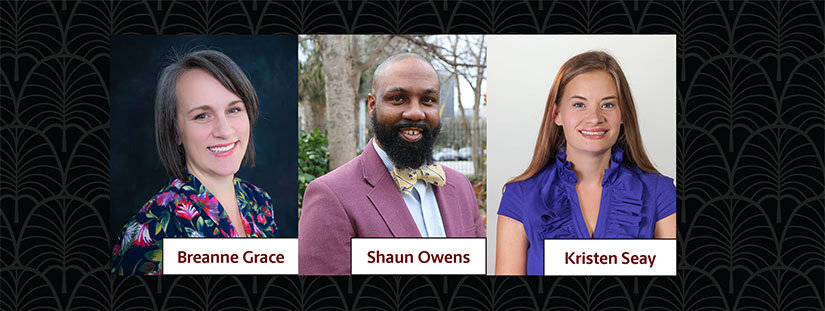July 2, 2020
Chris Woodley • cwoodley@mailbox.sc.edu
Interim Dean Ronald Pitner recently announced the approval of tenure for Breanne Grace, Shaun Owens and Kristen Seay from assistant to associate professors. Their promotion to associate professor will be effective August 16. Tenure decisions require a record of accomplishments and continuing development of faculty members in research, teaching, service, and development of national or international reputation in a field.
Grace joined the College of Social Work faculty in 2013. She previously worked in humanitarian aid in refugee camps in East Africa and with East African refugee communities in California. Her research focuses on issues related to immigrants and refugees, including those who are survivors of torture. Grace’s research has been funded by Fulbright-Hays, Fulbright, Andrew Mellon Foundation, U.S. Department of State, and local foundations and internal sources. In 2019, she was recognized by the University of South Carolina Office of the Vice President for Research as a Breakthrough Star. She also worked alongside Associate Professor Ben Roth and Assistant Professor John Doering-White to establish the college’s Center on Migration, Policy, Services and Society. Grace and Roth authored, “The Violence of Uncertainty – Undermining Immigrant and Refugee Health,” which was published in the New England Journal of Medicine in 2018. That same year, she was invited by the United Nations High Commissioner for Refugees to speak on durable solutions to long-term displacement at the UNHCR headquarters in Geneva, Switzerland.
Earning tenure means much more to me than job security. I am the first in my family to receive a terminal degree and the first to hold a tenure-earning role at an academic institution. Therefore, earning tenure represents my family’s collective advancement in higher education.
- Shaun Owens
Owens began teaching at the college in 2014. He serves as director for the Healthy Aging Research and Technology Lab, which helps older adults make informed health decisions that enable them to age in place. He is also associate director of the university’s SmartHOME Center, which develops technologies to enable older adults to remain healthy and independent. Owens research interests are health and cancer communications with diverse populations, technology for health promotion, informed decision making in aging adults and smart and connected health opportunities. His recent research has examined improving screening rates of at-risk individuals for lung cancer, multiple behavioral change and symptom management for individuals facing lung cancer, and the effects of emotion on prostate cancer treatment decision making. Earlier this year, Owens was named a 40 Under 40 Leader in Health by the National Minority Quality Forum, and was selected for the American Association of State Colleges and Universities 2020 Emerging Leaders Program cohort.
“I look forward to the opportunity to continue my scholarship focused on improving the lives of children and families.”
- Kristen Seay
Seay joined the college in 2014. Her research interests include the impact and treatment of substance abuse in families, the prevention of child abuse and neglect, and improving the well-being of families. She currently serves as principle investigator on a Duke Endowment research study to develop a health and education information exchange for children and youth in foster care in South Carolina. Seay has also performed research that addresses the social, emotional, and behavioral health and healthy lifestyle behaviors in preschool children. Previous research studies have investigated child abuse prevention in South Carolina, and preventing Conduct Disorder among children in the child welfare system. Last year, Seay co-authored, “Mechanisms of deterrence: Federal immigration policies and the erosion of immigrant children’s rights,” which was published in the American Journal of Public Health. She has also recently co-authored on topics including, problematic substance use in the child welfare system, and harsh physical punishment as a mediator between income and out-of-home placement in child protective services-involved populations.
